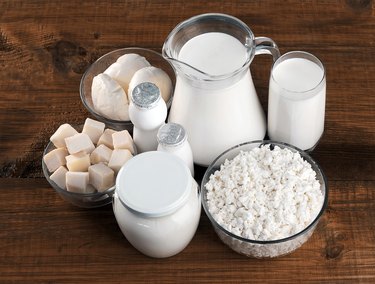
Lactose intolerance does not affect the cardiovascular system and does not cause heart palpitations. A milk allergy, which can cause heart palpitations, is commonly confused with lactose intolerance. If you develop heart palpitations after eating dairy products, you need to call your doctor because it may be a sign of anaphylaxis, a severe allergic reaction that could lead to death.
Lactose Intolerance versus Milk Allergy
Video of the Day
Lactose intolerance and a milk allergy are easily confused because the conditions cause similar digestive symptoms after ingesting dairy products. Lactose intolerance is a digestive complications caused by the inability to digest the sugar found in milk. A milk allergy is a defect of the immune system that can affect your respiratory, digestive and cardiovascular systems. A milk allergy also commonly causes skin inflammation that can lead to hives and eczema. Lactose intolerance will only cause digestive symptoms such as diarrhea, cramping, bloating and gas.
Video of the Day
Heart Palpitations
Heart palpitations that develop shortly after consuming dairy products are the result of a severe allergic reaction. Your immune system mistakes the casein and whey proteins found in milk as a dangerous substance, causing your body to attack the proteins with different chemicals. If you develop anaphylaxis, the excessive amount of these chemicals causes shortness of breath, facial swelling, a lump to form in your throat, lightheadedness and an increased heart rate. These symptoms are alarming and need to be evaluated by emergency medical professionals.
Treatment
The most effective treatment for anaphylaxis is an injection of epinephrine. If you have been diagnosed with a severe milk allergy, ask your doctor about carrying an epinephrine pen on your person in case of an emergency. If you don't have a epinephrine pen, you need to call 911 right away. Epinephrine is synthetic adrenaline that restores the body to its normal functionality. Without this medication, complications can develop, leading to death.
Prevention
If you're diagnosed with a milk allergy, you will need to avoid all products that contain milk. This includes yogurt, cheese, whipped cream, ice cream, milk, whey protein powder, non-dairy creamers, deli meats and salad dressings. If you eliminate milk from your diet your doctor may recommend that you increase your daily calcium intake by either taking a supplement or eating more spinach, broccoli or canned fish.
Is this an emergency? If you are experiencing serious medical symptoms, please see the National Library of Medicine’s list of signs you need emergency medical attention or call 911.